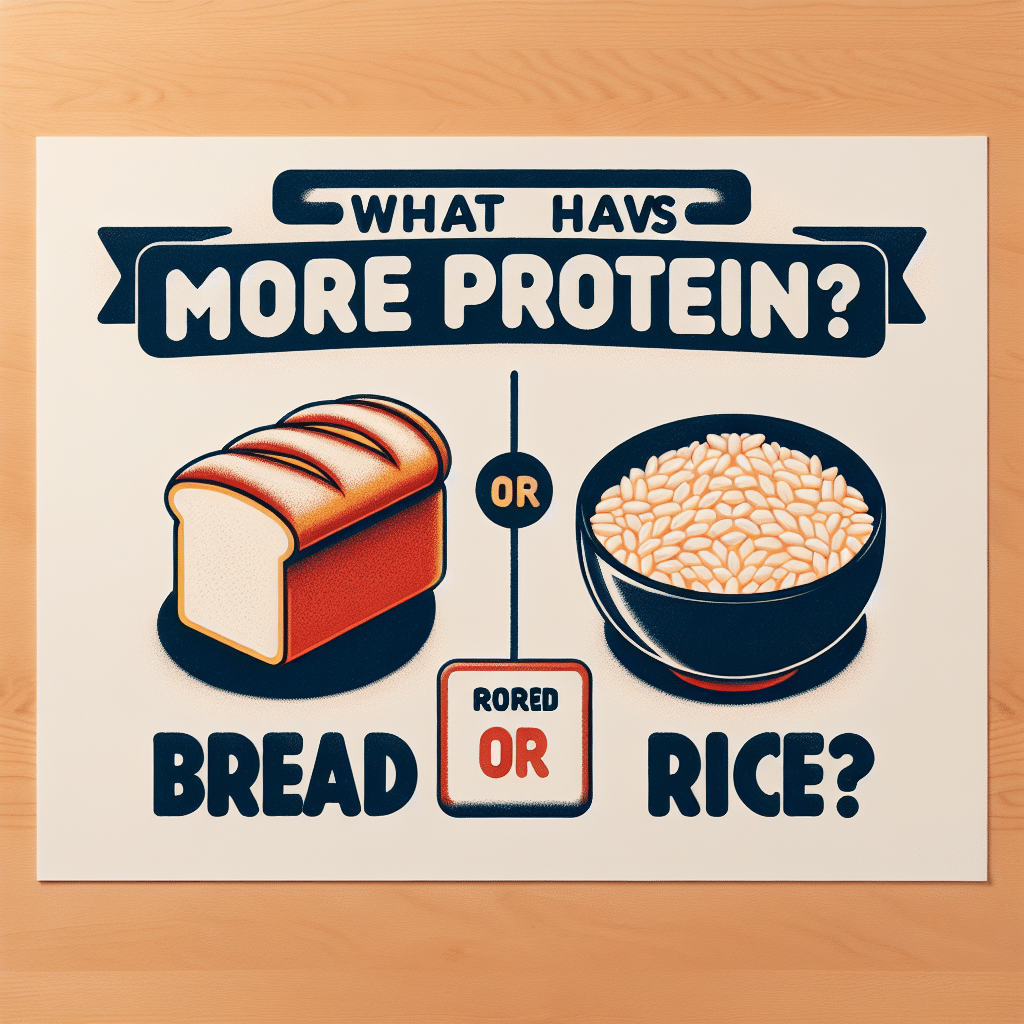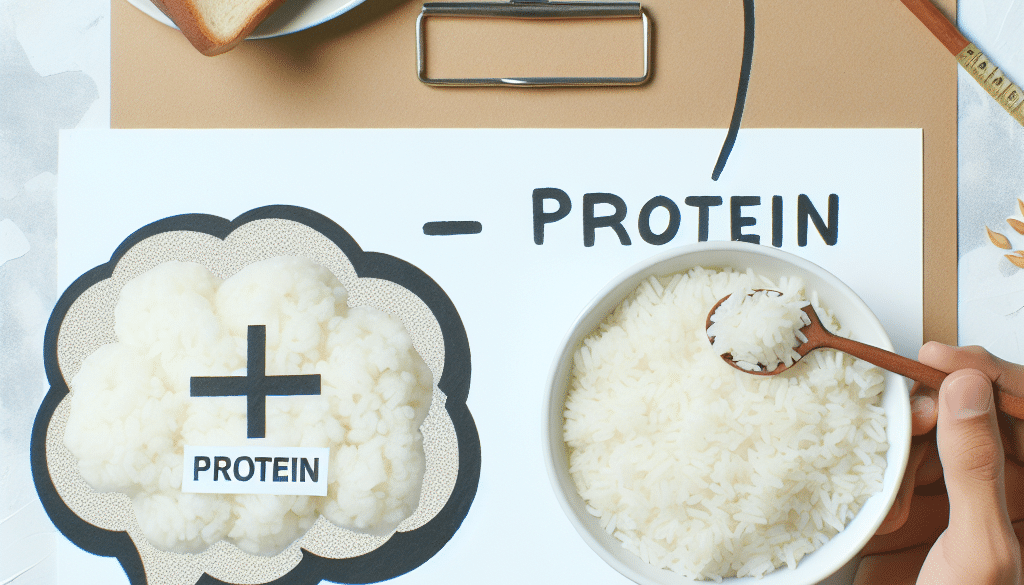What Has More Protein Bread Or Rice? Deep dive
Table of Contents
- Protein Showdown: Bread vs. Rice – Which Packs More Punch?
- Understanding Protein in Our Diet
- The Protein Content of Bread
- The Protein Content of Rice
- Comparing Bread and Rice: Which Has More Protein?
- Factors Influencing Protein Content
- Quality of Protein: Amino Acid Profile
- Conclusion: Making the Right Choice for Your Protein Needs
- ETprotein: Your Source for High-Quality Protein Products
Protein Showdown: Bread vs. Rice – Which Packs More Punch?

When it comes to dietary staples, bread and rice are two of the most commonly consumed foods worldwide. They serve as the foundation for countless meals and are valued for their versatility and energy-providing carbohydrates. However, for those looking to optimize their protein intake, the question often arises: which one offers more protein? In this article, we’ll delve into the protein content of bread and rice, explore the factors that influence these levels, and provide a comprehensive comparison to help you make informed dietary choices.
Understanding Protein in Our Diet
Protein is a crucial macronutrient necessary for building and repairing tissues, making enzymes and hormones, and supporting overall health. It’s composed of amino acids, some of which are essential and must be obtained through diet. The Recommended Dietary Allowance (RDA) for protein is 0.8 grams per kilogram of body weight per day for the average adult, though this can vary based on age, sex, and activity level.
The Protein Content of Bread
Bread comes in many forms, from white and whole wheat to rye and sourdough. The protein content can vary significantly depending on the type of flour used and the addition of other ingredients like seeds and nuts. On average, a slice of white bread contains about 2 to 3 grams of protein, while whole wheat bread can contain 3 to 5 grams per slice. Specialty breads with added seeds and grains can have even higher protein levels.
The Protein Content of Rice
Rice is another staple food that’s consumed in large quantities around the globe. The protein content in rice also varies, with white rice offering approximately 2 to 3 grams of protein per cooked cup (about 158 grams). Brown rice, on the other hand, typically contains slightly more protein, with about 3 to 5 grams per cooked cup. The difference is due to the presence of the bran and germ in brown rice, which are removed in white rice.
Comparing Bread and Rice: Which Has More Protein?
When comparing the protein content of bread and rice, it’s important to consider the serving sizes and the specific types of each food. Here’s a breakdown:
- White Bread: Approximately 2-3 grams of protein per slice
- Whole Wheat Bread: Approximately 3-5 grams of protein per slice
- White Rice: Approximately 2-3 grams of protein per cooked cup
- Brown Rice: Approximately 3-5 grams of protein per cooked cup
Based on these averages, whole wheat bread and brown rice are the better options for those seeking more protein. However, it’s also essential to consider the overall nutritional profile, including fiber, vitamins, and minerals, when choosing between these foods.
Factors Influencing Protein Content
The protein content in bread and rice can be affected by several factors:
- Processing: The removal of the bran and germ during the refining process lowers the protein content in white rice compared to brown rice.
- Flour Type: Bread made with whole grain flours generally has more protein than bread made with refined flours.
- Additives: The inclusion of seeds, nuts, or other protein-rich ingredients can boost the protein content in bread.
Quality of Protein: Amino Acid Profile
While quantity is important, the quality of protein—determined by its amino acid profile—is also crucial. Both bread and rice are considered incomplete proteins because they lack one or more essential amino acids. However, when combined with other foods like legumes, which complement their amino acid profiles, they can form a complete protein source.
Conclusion: Making the Right Choice for Your Protein Needs
In conclusion, both bread and rice can contribute to your daily protein intake, but whole wheat bread and brown rice are superior choices due to their higher protein content and additional nutritional benefits. It’s important to consider not just the quantity but also the quality of protein by combining these foods with other protein sources to ensure a balanced diet.
For those looking to increase their protein intake further, ETprotein offers a range of high-quality protein products that can complement any diet.
ETprotein: Your Source for High-Quality Protein Products
If you’re seeking to enhance your protein consumption, ETprotein’s diverse selection of organic bulk vegan proteins is an excellent choice. Their products, including organic rice protein and pea protein, are characterized by a neutral taste and are non-GMO and allergen-free. With L-(+)-Ergothioneine purity over 98%, ETprotein caters to various industries, ensuring that you have access to the best protein supplements to meet your dietary needs.
About ETprotein:
ETprotein, a reputable protein and L-(+)-Ergothioneine (EGT) Chinese factory manufacturer and supplier, is renowned for producing, stocking, exporting, and delivering the highest quality organic bulk vegan proteins and L-(+)-Ergothioneine. They include Organic rice protein, clear rice protein, pea protein, clear pea protein, watermelon seed protein, pumpkin seed protein, sunflower seed protein, mung bean protein, peanut protein, and L-(+)-Ergothioneine EGT Pharmaceutical grade, L-(+)-Ergothioneine EGT food grade, L-(+)-Ergothioneine EGT cosmetic grade, L-(+)-Ergothioneine EGT reference grade and L-(+)-Ergothioneine EGT standard. Their offerings, characterized by a neutral taste, non-GMO, allergen-free attributes, with L-(+)-Ergothioneine purity over 98%, 99%, cater to a diverse range of industries. They serve nutraceutical, pharmaceutical, cosmeceutical, veterinary, as well as food and beverage finished product distributors, traders, and manufacturers across Europe, USA, Canada, Australia, Thailand, Japan, Korea, Brazil, and Chile, among others.
ETprotein specialization includes exporting and delivering tailor-made protein powder and finished nutritional supplements. Their extensive product range covers sectors like Food and Beverage, Sports Nutrition, Weight Management, Dietary Supplements, Health and Wellness Products, and Infant Formula, ensuring comprehensive solutions to meet all your protein needs.
As a trusted company by leading global food and beverage brands and Fortune 500 companies, ETprotein reinforces China’s reputation in the global arena. For more information or to sample their products, please contact them and email sales(at)ETprotein.com today.












